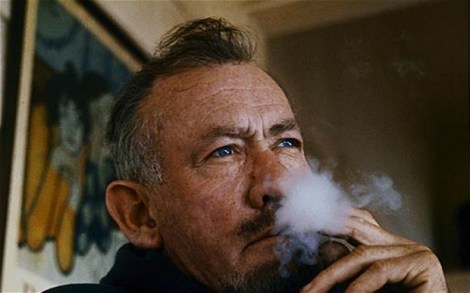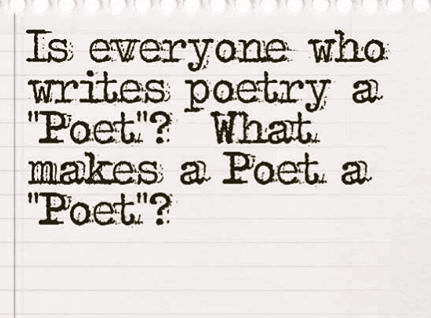R.M. Engelhardt's Blog: Burn Brightly, page 25
July 28, 2013
Pushing verses Past Their Limits …
By Lynn Alexander, Full of Crow Magazine
 R.M. Engelhardt acknowledges that there is a difference between the passive participant and those who live a passion-driven life, but can often be seen in “Versus” wondering if there is a difference in the end. Passion clearly perpetuates the creative imperative, manifest in poets like Engelhardt as non-negotiable, but to what end? There comes a time in the life of the poet where this question has to be dealt with. It is one thing to accept the terms of “the muse”. It is another to toil in the direction of some outcome, some goal. What, beyond that yielding and succumbing, is the poet desirous of? Fame, significance, appreciation, relevance? The poet succumbs because he or she must, but it doesn’t end there. The poet is driven to more just as the living are driven to interact in this world beyond survival. We do more than eat and breed and sleep, there is something that pushes us. But why? In the years that I have been aware of Engelhardt’s work, it is this willingness to examine these concerns head on and in a surprisingly candid manner that I think captures my interest the most in his work, which often gets into the problematic terrain of ego, and the ways that we relate to one another through not only our life’s work but through love and community. He states rather directly in “Versus” that poetry is dead, he comments on the state of popular culture and asks the obvious questions about the poet’s role in it. Why bother, and why persist? Persistence, I think, is the theme in Engelhardt’s work that prompts people to characterize him as “romantic” as many of the poems convey a sense of pining, portraying people desirous not only of love but of transcendent relationships. “She believes in something unseen”, (8, “Perhaps”) “I’m just sick of passing romances”. (“In Cleopatra’s Eyes”, 9) In ‘Versus”, we see that relationship between the speakers and both issues: wanting to do more than write, wanting to do have more than a date on a Saturday night. (“toys”, 6, “More than just another dance”, 2) This idea of wanting more, wanting to believe in and have faith in that but at the same time considering one’s observations and wanting to be rational. Persistence then is challenged by cynicism, both inner and external: “The time for poets has passed” “And someone once told me that honest people don’t exist anymore in the 21st century” “And someone once told me ‘That love…is dead.” Do we persist, press on anyway? In “Naïve”, Engelhardt describes the urge to avoid the trainwreck. In “Truth” we see people opening boxes, digging through metaphorical “boxes” of expectations mingled with mythology. What happens when people confront truth? Some thrive, some perish, some vanish immediately in the sight of their realizations. This brings us back, again and again, to the questions in “Versus”. What are we after? And can we get there? ‘We all grow older/Still trying to find our way/Like children” (“Any Day Now”, 11) Many poets grapple with a maturing phase not unlike the point around mid-life when one begins to really take stock about where to put energy, what to be concerned with and what to let go of. Some describe it much like finding their way, having gone through what some describe as a period similar to the honeymoon phase of a relationship. There are burdens in the poet’s world, choices about resources and time and energy and in the beginning there can be a sense of eventual payoff that in later years we learn can be quite elusive. There’s no denying that Engelhardt has love for the craft, but he pushes us to consider what that means, and to perhaps distinguish between the love of writing and the expectations. In some instances, the object of love can be easily interchangeable with “the muse” as both are subjects in these poems of that transcendent longing. The love that leaves for the man who promises everything, the “angel” who vanishes, the losses are connected: the poet wants to believe in more, wants to have faith in more, but life can be a series of losses, followed by grief. Engelhardt closes “Versus” with a shout-out to those who persist, who don’t give up, who keep searching and don’t give in, who stay true to the realm of dreams.
R.M. Engelhardt acknowledges that there is a difference between the passive participant and those who live a passion-driven life, but can often be seen in “Versus” wondering if there is a difference in the end. Passion clearly perpetuates the creative imperative, manifest in poets like Engelhardt as non-negotiable, but to what end? There comes a time in the life of the poet where this question has to be dealt with. It is one thing to accept the terms of “the muse”. It is another to toil in the direction of some outcome, some goal. What, beyond that yielding and succumbing, is the poet desirous of? Fame, significance, appreciation, relevance? The poet succumbs because he or she must, but it doesn’t end there. The poet is driven to more just as the living are driven to interact in this world beyond survival. We do more than eat and breed and sleep, there is something that pushes us. But why? In the years that I have been aware of Engelhardt’s work, it is this willingness to examine these concerns head on and in a surprisingly candid manner that I think captures my interest the most in his work, which often gets into the problematic terrain of ego, and the ways that we relate to one another through not only our life’s work but through love and community. He states rather directly in “Versus” that poetry is dead, he comments on the state of popular culture and asks the obvious questions about the poet’s role in it. Why bother, and why persist? Persistence, I think, is the theme in Engelhardt’s work that prompts people to characterize him as “romantic” as many of the poems convey a sense of pining, portraying people desirous not only of love but of transcendent relationships. “She believes in something unseen”, (8, “Perhaps”) “I’m just sick of passing romances”. (“In Cleopatra’s Eyes”, 9) In ‘Versus”, we see that relationship between the speakers and both issues: wanting to do more than write, wanting to do have more than a date on a Saturday night. (“toys”, 6, “More than just another dance”, 2) This idea of wanting more, wanting to believe in and have faith in that but at the same time considering one’s observations and wanting to be rational. Persistence then is challenged by cynicism, both inner and external: “The time for poets has passed” “And someone once told me that honest people don’t exist anymore in the 21st century” “And someone once told me ‘That love…is dead.” Do we persist, press on anyway? In “Naïve”, Engelhardt describes the urge to avoid the trainwreck. In “Truth” we see people opening boxes, digging through metaphorical “boxes” of expectations mingled with mythology. What happens when people confront truth? Some thrive, some perish, some vanish immediately in the sight of their realizations. This brings us back, again and again, to the questions in “Versus”. What are we after? And can we get there? ‘We all grow older/Still trying to find our way/Like children” (“Any Day Now”, 11) Many poets grapple with a maturing phase not unlike the point around mid-life when one begins to really take stock about where to put energy, what to be concerned with and what to let go of. Some describe it much like finding their way, having gone through what some describe as a period similar to the honeymoon phase of a relationship. There are burdens in the poet’s world, choices about resources and time and energy and in the beginning there can be a sense of eventual payoff that in later years we learn can be quite elusive. There’s no denying that Engelhardt has love for the craft, but he pushes us to consider what that means, and to perhaps distinguish between the love of writing and the expectations. In some instances, the object of love can be easily interchangeable with “the muse” as both are subjects in these poems of that transcendent longing. The love that leaves for the man who promises everything, the “angel” who vanishes, the losses are connected: the poet wants to believe in more, wants to have faith in more, but life can be a series of losses, followed by grief. Engelhardt closes “Versus” with a shout-out to those who persist, who don’t give up, who keep searching and don’t give in, who stay true to the realm of dreams.


“I’m not sure what I’ll do, but – well, I want to go pl...
“I’m not sure what I’ll do, but – well, I want to go places and see people.
I want my mind to grow. I want to live where things happen on a big scale.”
~
F. Scott Fitzgerald


July 26, 2013
TEXAS …
“I have said that Texas is a state of mind, but I think it is more than that. It is a mystique closely approximating a religion. And this is true to the extent that people either passionately love Texas or passionately hate it and, as in other religions, few people dare to inspect it for fear of losing their bearings in mystery or paradox. But I think there will be little quarrel with my feeling t…hat Texas is one thing. For all its enormous range of space, climate, and physical appearance, and for all the internal squabbles, contentions, and strivings, Texas has a tight cohesiveness perhaps stronger than any other section of America. Rich, poor, Panhandle, Gulf, city, country, Texas is the obsession, the proper study, and the passionate possession of all Texans.”
~ John Steinbeck, Travels with Charley: In Search of America


July 23, 2013
Without …
“As honest as you can expect a man to be in a world where its going out of style.”
― Raymond Chandler, The Big Sleep
Raymond Thornton Chandler (July 23, 1888 – March 26, 1959)


July 19, 2013
”Between two evils, I always pick the one I never ...
July 15, 2013
R.M. Engelhardt : Four New Poems On The Outlaw Poetry Network
July 14, 2013
And Thus We Must Ask The Question …
REALITY IS BAD FOR BIZNESS
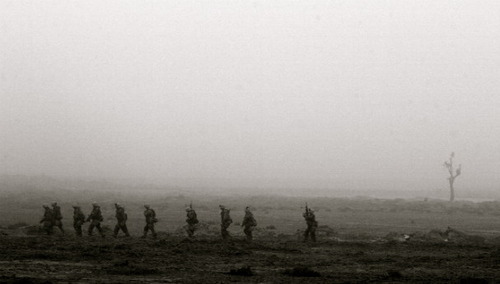
Before super models
Ruled the earth
There were people.
Before idiots
Controlled
The government
There were wise men.
The future
Is now
The past.
Desolate faces
Ride subway trains & buses without
Hope. Hoping.
And politics
Has become
A children’s
Game.
While going down
On Madison Avenue
The persuaders,
Manipulators & Predators Worship
In churches
Of nothingness.
In churches
Of shit.
The media
Ignoring What is To come
And be.
Because it’s Bad for publicity
And bad
For business.
That these truths
Are self-evident.
That people
Are dying
Over oil reserves
In the Middle East.
That people
Are being denied
Their rights.
That No one has
The balls to
Stop the maniacs
Who’ve taken over
Our lives.
So just accept it.
Relax.
Buy a coke
And a smile.
As the lights
In your child’s
Eyes
Dim.
Fade.
And go out.
_____________
~ R.M. 2005


July 10, 2013
His hunger and thirst had been immense: he was caught u...
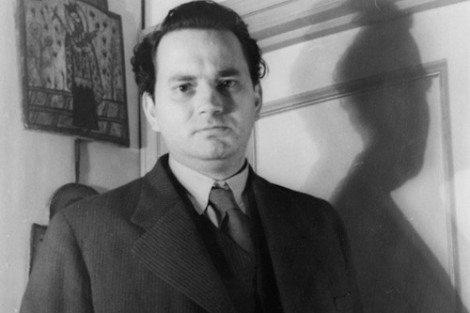
His hunger and thirst had been immense: he was caught up for the first time in a Faustian web—there was no food that could feed him, no drink that could quench his thirst. Like an insatiate and maddened animal he roamed the streets, trying to draw up mercy from the cobblestones, solace and wisdom from a million sights and faces, or he prowled through endless shelves of high-piled books, tortured by everything he could not see and could not know, and growing blind, weary, and desperate from what he read and saw. He wanted to know all, have all, be all—to be one and many, to have the whole riddle of this vast and swarming earth as legible, as tangible in his hands as a coin of minted gold.”
~
Thomas Wolfe, Of Time and the River


July 8, 2013
“And this I believe: that the free, exploring mind of ...
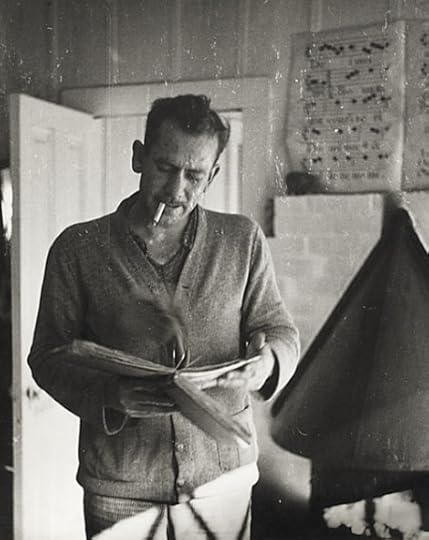
“And this I believe: that the free, exploring mind of the individual human is the most valuable thing in the world. And this I would fight for: the freedom of the mind to take any direction it wishes, undirected. And this I must fight against: any idea, religion, or government which limits or destroys the individual. This is what I am and what I am about.”
~
John Steinbeck, East of Eden


Burn Brightly
~ R.M. Engelhardt ...more
- R.M. Engelhardt's profile
- 23 followers



